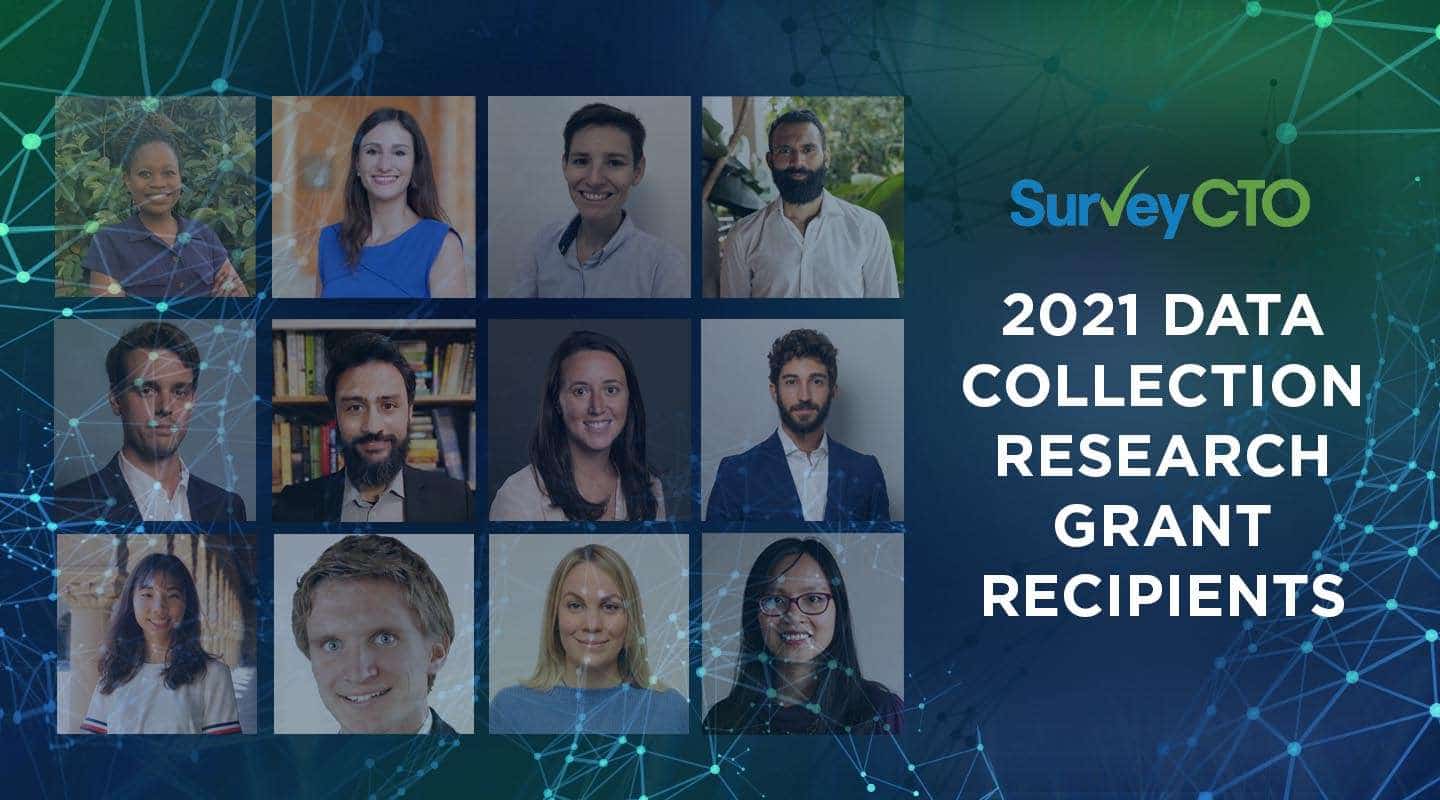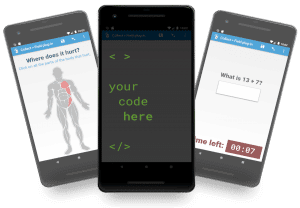These graduate researchers will receive funding and support for their innovative, impactful research projects
The SurveyCTO team has a deep appreciation for the challenges associated with doing fieldwork. Most of us have backgrounds collecting data in the field, and we joined SurveyCTO because we want to make data collection easier and more accessible.
That is why we’re so excited to announce the awardees of the first-ever SurveyCTO Data Collection Research Grant, which supports innovative, impactful research in a holistic way by providing both cash grants and technical tools for data collection.
SurveyCTO Data Collection Research Grant class of 2021
Let’s introduce you to this year’s recipients.
Patrick Agte, Ph.D. candidate in Economics at Princeton University. “The Equilibrium Effects of Improved Public Primary Healthcare: Evidence from the Health and Wellness Centers in India.”
“In a nationwide public primary healthcare reform in India, 150,000 remote maternal and child health outposts are upgraded to basic outpatient care facilities through an additional mid-level provider. We collaborate with the Government of Rajasthan to exploit the ongoing rollout and investigate the equilibrium effects of the reform using experimental and quasi-experimental methods.”
Luisa Cefala, Ph.D. candidate at the Department of Economics at the University of California, Berkeley. “Labor market constraints to technology adoption: evidence from rural Burundi.”
“We design a randomized intervention to test whether training the village labor force in new agricultural technologies benefits village workers, through more employment, and the community, through more takeup of the more advanced agricultural technology. This is conducted in partnership with the NGO “One Acre Fund” in Burundi.”
Partial grant recipients
Carolyn Pelnik, Economics and Public Policy Ph.D. candidate at the Department of Economics at Tufts University. “Identifying and Easing Constraints on Microenterprise Location in Kampala, Uganda.”
“In the first project, I ask whether business relocation within the city can increase profits for urban microfirms in Kampala, Uganda, and if so, then what frictions constrain a firm’s ability to relocate without intervention. In this second project, my co-authors (Viva Bartkus of the University of Notre Dame, Wyatt Brooks of Arizona State University, and Joe Kaboski of the University of Notre Dame) and I study a program that works with small agribusinesses to build ties with local supply chains in remote regions of Colombia.”
Claude Raisaro, Economics Ph.D. candidate at the University of Zurich, Department of Economics. “Unlawful Behaviors, Monetary Incentives and Social Status: Experimental Evidence from the Ugandan Transit Industry.”
“In this project, I study how public monetary incentives enable avoidance of norms that promote unlawful behaviors. I look at the Ugandan transit industry where laws punish speeding but drivers reap off social image benefits from being perceived as speed lovers. I pinpoint the excuse mechanism through a randomized controlled trial. The population of interest are motor taxi drivers in the metropolitan area of Kampala.”
Emma Smith, Ph.D. in Public Policy at Harvard University. “Using peers to erode stigma and encourage mental health care-seeking among Syrian refugees.”
“When sharing mental health awareness content with people in need, is receiving content from a well-known NGO or from a friend more likely to encourage care-seeking and decrease the recipient’s beliefs of mental health stigma? This study strives to answer the above question with a randomized controlled trial (RCT) among Syrian refugees in Jordan.”
Francesco Loiacono, Economics Ph.D. candidate at the Institute for International Economic Studies (IIES) at Stockholm University. “Refugees’ Integration and Employers’ Learning: Evidence from Uganda.”
“This paper aims at…studying ways to reduce frictions to labor market integration of refugees in a low-income country. We conduct a two-sided RCT tackling information frictions to both sides of the labor market. The RCT has two components: a random assignment of treatments and a one-to-one matching of local employers and refugees.”
Isabelle Salcher, Ph.D. candidate at New York University, Department of Economics. “Microentrepreneurs and Gendered Opportunity Costs of Time.”
“This project seeks to answer three research questions. First, to what extent do opportunity costs of time differ by gender? Second, to what extent do domestic responsibilities explain different opportunity costs? And third, does women’s bargaining power narrow these differences?”
Lame Ungwang, Ph.D. candidate in Economics (Development and Behavioral) at the Friedrich-Schiller University of Jena, Department of Economics. “Nudging technology adoption: Experimental evidence on menstrual cup uptake in Botswana.”
“In this study, I explore the effects of information framing and the choice environment on encouraging individual adoption of a new technology – the menstrual cup – among young women in a developing country context (Botswana). Employing a survey experiment with a 2×2 design, I vary whether participants receive information about this technology in a “neutral” or a more “positive” frame.”
Linh P. Nguyen, Ph.D. candidate in Survey Methodology at the University of Essex. “Survey Experiment on Translation and Data Quality in Zambia.”
“This proposed study is based on my previous research on investigating interviewer variances in the data collection waves within the evaluation study on “Impacts of linking savings group to formal financial service providers and strengthening their internal group insurance mechanism in Zambia” – a rural finance project funded by the International Fund for Agricultural Development (IFAD). I found considerably high interviewer variance, which consequently poses threats to data quality. With this study proposal, I would like to further investigate the scope of deviations from standardization and potential data quality issues produced by on-the-fly translation.”
Mattia Fracchia, Economics and Finance Ph.D. candidate at the Nova School of Business and Economics – Universidade Nova de Lisboa. “Information Design to Improve Service Delivery: Experimental Evidence from Guinea-Bissau.”
“This study contributes to three strands of literature addressing the open question on how to motivate last-mile workers in low-income settings. It does so by (i) eliciting and characterizing CHWs’ [Community Health Workers’] baseline beliefs about their impact, (ii) evaluating the efficacy of an information design approach to motivate them, and (iii) testing the relative efficacy of employing rigorous empirical evidence vis-`a-vis traditional anecdotal narratives to raise awareness about impact.”
Muhammad Zia Mehmood, Ph.D. candidate in Business and Public Policy at the Haas School of Business at the University of California, Berkeley. “Training with Technology – Lessons from a field experiment with Kenyan MSMEs.”
“In my proposed research, I intend to (1) Explore the effectiveness of SMS-based business trainings for Micro, Small and Medium Enterprises (MSMEs), (2) Estimate MSME owners’ willingness to pay for these trainings, and (3) Study complementarities between these trainings and exposure to a new profit-increasing technology in terms of the effect on business performance.”
Sally Zhang, Economics Ph.D. candidate in the Department of Economics at Stanford University. “Hidden Income, Household Survey, and Intrahousehold Inequality.”
“Research Question: 1. Are survey measures of household income and consumption biased if only one household member is surveyed? What is the extent of such bias? 2. Do respondents answer survey questions differently, depending on who is present? 3. If different household members answer the same question differently, what can we infer about hidden income/consumption and household inequality? 4. Who should we survey in a household with limited budget?”
Look out for updates about these projects
Congratulations to the grant recipients. We’re thrilled about the opportunity to partner with up-and-coming researchers who are making a meaningful difference in their local communities, cities, and regions. We’re also excited to see how these recipients use SurveyCTO in new ways and uncommon use cases. Over the next few months, we will be sharing more information about these exciting projects. So stay tuned and subscribe to our blog updates to receive instant updates.
Curious about the SurveyCTO platform? Start a free, 15-day trial and build your first form today.




